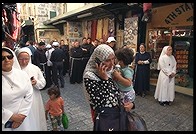
A Photographer's Guide to Israel
by Philip Greenspun; created 2000
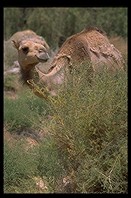
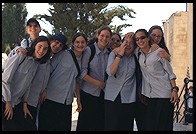 If you have only a week or two to travel, Israel is one of the
world's most interesting destinations. The country contains an overlapping mix of
Western and Arab cultures, of Jewish, Christian, and Muslim religions, of modern
and ancient historical sites, all crammed into an area the size of New
Jersey.
If you have only a week or two to travel, Israel is one of the
world's most interesting destinations. The country contains an overlapping mix of
Western and Arab cultures, of Jewish, Christian, and Muslim religions, of modern
and ancient historical sites, all crammed into an area the size of New
Jersey.
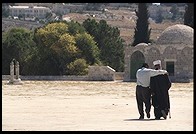 The best months to visit Israel are April, May,
and October. It can be rainy and gray from mid-November through March. The summer
is too hot for enjoyable mid-day tourism and also the light will tend to be
rather too flat for interesting photography.
The best months to visit Israel are April, May,
and October. It can be rainy and gray from mid-November through March. The summer
is too hot for enjoyable mid-day tourism and also the light will tend to be
rather too flat for interesting photography.
Most of the year, Israel is sunny and the light is harsh. The best general-purpose film might be a low-contrast ISO 400 color negative film intended for weddings (as of November 2000 the leaders in this area are Fuji NPH and Kodak Portra 400).
Tourism is one of the largest industries in Israel and therefore the population is accustomed to camera-happy tourists. As in most street photography situations, a smile goes a long way toward making your subjects feel comfortable. Observant Jews will not appreciate being photographed on Shabbat (sundown Friday through sundown Saturday), when they themselves would be unwilling to operate a camera. The security forces at the Western Wall will actually prevent you from taking pictures there on Shabbat.
Professional cameras and film are reasonably easy to buy in Tel Aviv but high taxes and limited competition mean that you're much better off bringing everything in from home. When flying to Israel, keep your camera equipment in carry-on luggage if possible. My checked-through bag was held at Frankfurt Airport by German security for two days. Upon X-raying the bag, which had cleared Boston's Logan Airport security without troubles, they saw a Canon EOS body and 3 lenses. The Germans kept the suitcase for 48 hours, presumably to see if it would explode. Not only was I unable to take pictures but I had to buy all new clothing at the local market in Tel Aviv (genuine Ralph Lauren polo shirts for $3 each).
If possible, avoid having film developed in Israel. It is a small country. It is a poor country. They have more to worry about than a speck of dust on your film, a slight color cast, or 1/3-stop overdevelopment.
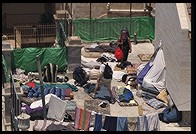 You need a passport valid for at least six
months to get into Israel. If you're from North America, Europe, Australia, or
New Zealand, you don't need a visa.
You need a passport valid for at least six
months to get into Israel. If you're from North America, Europe, Australia, or
New Zealand, you don't need a visa.
You will most likely be flying into Ben Gurion Airport. From here it is 14 miles to Tel Aviv and 28 miles to Jerusalem. The only other airport in Israel worth thinking about is Eilat--remember that Israel is only about the size of New Jersey. If the Red Sea is your destination, flying directly to Eilat will save you at least a four-hour drive through the Negev Desert. The big decision in flying to Israel is whether or not to fly El Al, the national carrier ( www.elal.com). El Al has very good food and service, at least in business class, and very new, all-Boeing, planes. However, security is tighter on El Al than other airlines. You'll have to show up a bit earlier at the airport and endure a 20-minute questioning.
Basic English is spoken by just about anyone touching the tourist trade. You might not be able to discuss the latest article from New Yorker magazine but you'll be able to rent a car, rent a mobile phone, buy a theater ticket (movies are presented in the original language with Hebrew subtitles), buy aspirin, ask directions, etc. Virtually every street sign is printed in both Hebrew and transliterated in roman characters. Road signs are in Hebrew and translated into English.
Food and tap water throughout Israel are safe for Western stomachs.
Electric power is 220V and plugs have three round pins. Better hotels have adapters to loan that will let you use a voltage-agile laptop or digital camera power supply.
The time in Israel is two hours ahead of Greenwich Mean Time (London), which makes it seven hours ahead of New York and one hour ahead of Paris. Thus if it is 9:00 am in New York, it is already 4:00 pm in Israel.
The currency in Israel is the New Israeli Shekel (NIS). You get about four of these to the dollar (check Yahoo! Finance for the latest rates). At least if you fly El Al, you have the opportunity to change money right on the plane. ATMs throughout Israel will dispense NIS from a Cirrus or Plus bank card as well as from credit cards. For hotels and such, you can often simply pay in US dollars.
For a country that has been in a state of official war with at least one neighbor for more than 50 years, Israel is remarkably safe. You will see soldiers in the streets carrying automatic rifles but 99% of the time they are just 18-year-olds on their way home for the weekend to sleep in their childhood room and eat Mom's cooking. Street crime is less common than in the US.
The most dangerous thing that you can do in Israel is to drive or ride in a car. The accident rate per passenger-mile is one of the highest in the world. Gold and Platinum Visa and Mastercard will cover your rental car collision insurance... except in Israel, Ireland, or Jamaica. Drivers are aggressive, roads are old, twisty, ill-designed, and overcrowded.